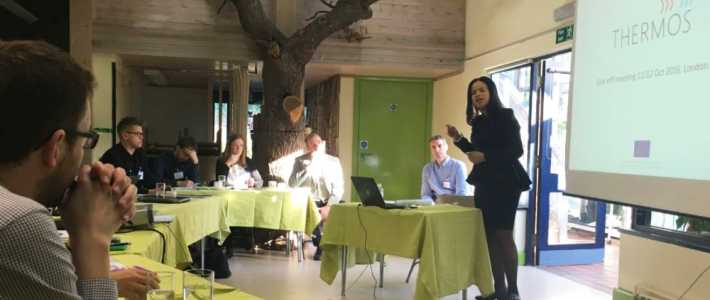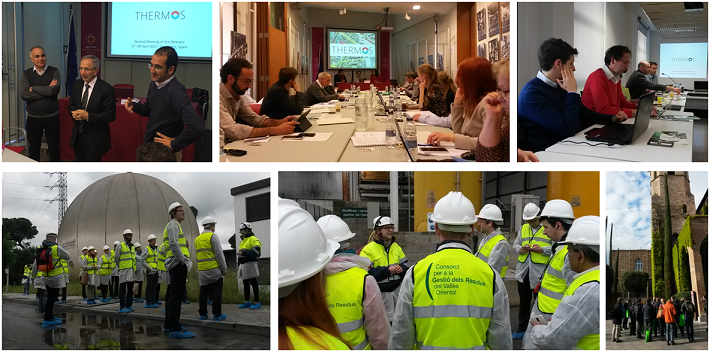Notícies
Notícies del projecte THERMOS i els seus socis.
01.02.2021
THERMOS supports greening energy supply at Romania Inspire Event
THERMOS replication partners from the city of Alba Iulia ended the year by introducing energy stakeholders looking to decarbonize energy supply in Romania to the THERMOS software. In a special online session on "Green energy - more green in the Centre Region – actions, projects and proposals" organized by the Regional Development Agency (ADRC), around 30 participants from municipalities, city councils, Alba Iulia’s energy agency (ALEA) and other local energy agencies and civil society were introduced to the THERMOS tool. THERMOS partners in the municipality of Alba Iulia, Maria Seemann and Bogdan Dogar, lined out the development of the tool and the functions and support it offers to local energy planners wishing to identify optimal low-carbon district energy solutions more cost- and time-effectively according to their own local project conditions. Based on the positive evaluation of the practice THERMOS offers for advancing low-carbon energy supply planning and networks, additional meetings are to be organized in this context.
For more information on THERMOS replication city Alba Iulia click here, and find recent results from exchanges with its pilot partner city Jelgava here.
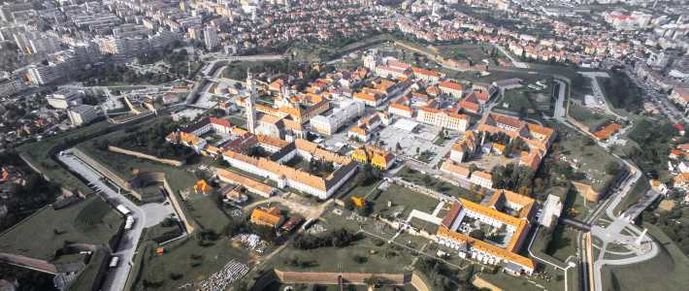
22.07.2020
THERMOS project extended: The journey continues!
THERMOS Partners will stay together to continue their quest for making the planning of low-carbon heating and cooling systems easier, quicker and cheaper. The project is officially going into extra time with Version 7 of the software available offering an advanced network supply optimisation model, THERMOS cooling mapping and a software user forum.
The additional months as part of the European Union’s H2020 programme will now be dedicated to further fine-tuning the software’s user interface, but also to offering additional free online training and capacity building programmes for local energy planners and authorities. Further work will also be done on validation of modelled results.
The THERMOS tool has undergone several iterations since the start of the project in October 2016. Version 7 of the software available now not only includes the option to model cooling networks, but also an advanced facility to optimise network supply – e.g. to take into account energy output or cost over time through varying demand profiles and different tariffs. Via the newly integrated THERMOS user forum, energy planners are now also able to benefit from exclusive user support and exchanges with fellow planners.
THERMOS pilot and replication cities and partners will stay on board for the extension with an additional Training Programme (pre-registration for Pathway D here) foreseen to take place later in 2020.
A dedicated THERMOS toolbox session at the Mannheim2020 conference on 2 October is a key opportunity to familiarise interested users with the latest software version. Further information and access to the THERMOS software can be found here. For user reviews click here and subscribe to the THERMOS newsletter for all the latest information on upcoming Training opportunities.
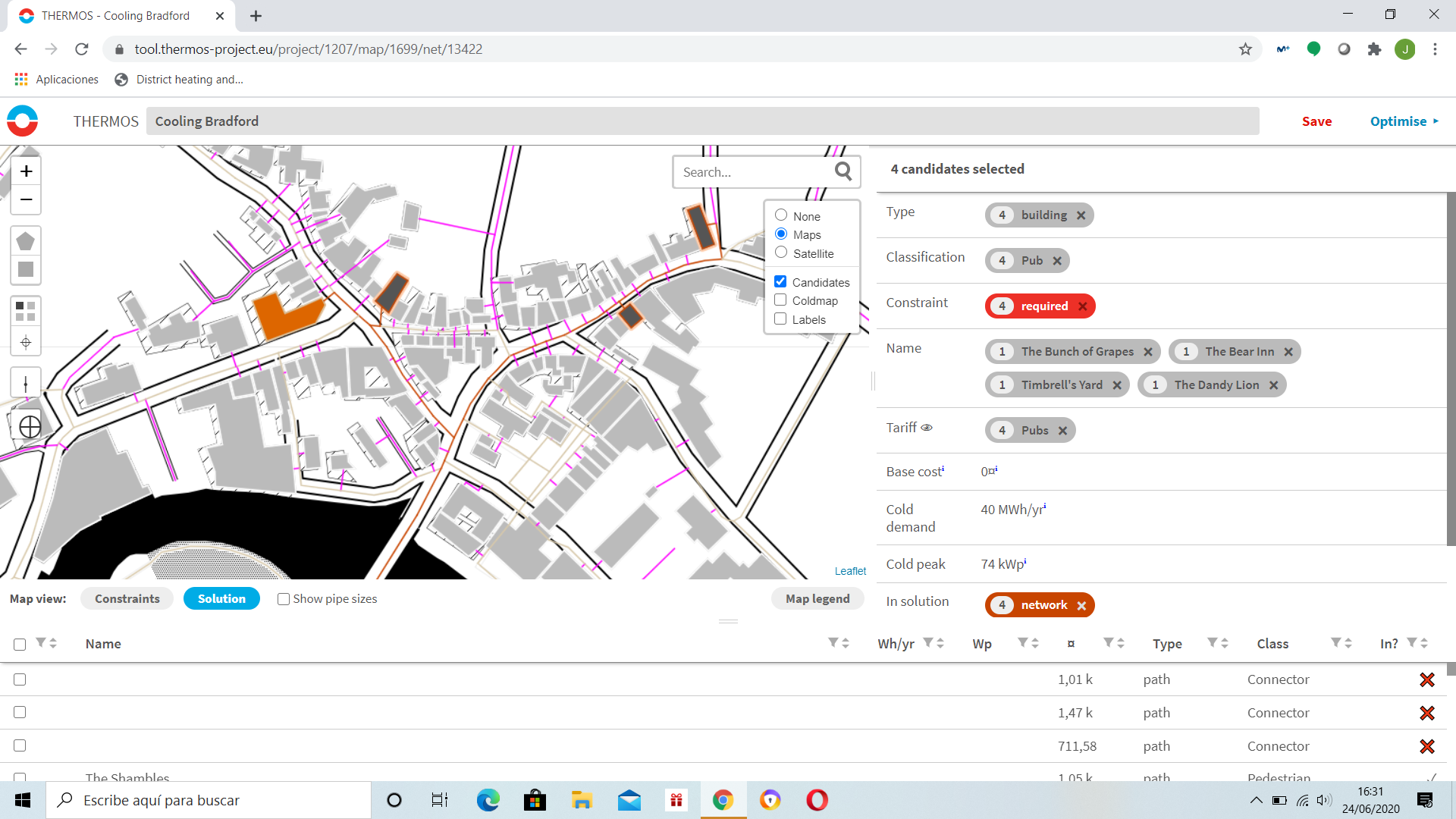
31.01.2020
THERMOS Training participants present case studies in Berlin
On 6 December 2019, THERMOS hosted its 5th Capacity Building and Training workshop in Berlin. The workshop marked the final event of the 2nd edition of the successful THERMOS Training Programme series. More than 40 Trainers from across Europe working in the field of district energy successfully completed the online training programme this January by developing case studies and exercises around core aspects of local district energy planning.
Training participants attending the workshop presented their case studies developed with the THERMOS energy planning software to an international audience. The three presented studies developed by the Metropolregion of Strasbourg, SF2E Ingenierie, ALLIng ABATE, modelled optimal network solutions for three small towns in Germany, Italy and France.
With overwhelmingly positive results from the first external test cases, the Training marked a key step and important stress test in the THERMOS software development process. Together with feedback from the last round of twinning meetings with THERMOS replication cities, the user experiences from trainers will inform the next updates of the interface and model.
Organised by the German Energy Agency (Dena) and hosted by the German Association of Local Utilities (VKU), the workshop closed with a visit to Vattenfall’s central cooling plant at Berlin Potsdamer Platz. The district cooling grid is serving around 10.000 offices, including the Sony Center, the German Ministry for Environment and the state parliament of Berlin.
Key training materials and webinars developed as part of the programme can be found here. THERMOS software users interested in certificates or getting engaged more intensely with THERMOS partners or the software can contact info@thermos-project.eu for upcoming opportunities.
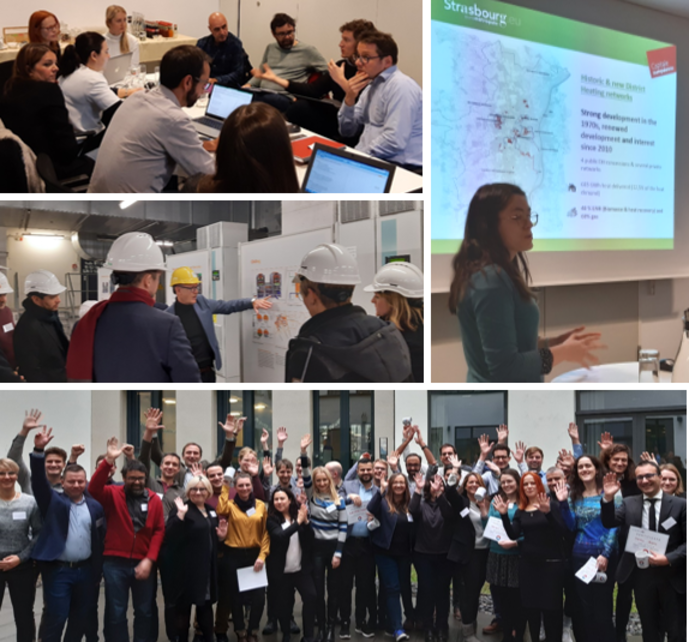
21.01.2020
London Boroughs exploring THERMOS to reach carbon neutrality
On 21 January 2020, THERMOS pilot city London Borough of Islington, its replication partner the Greater London Authority (GLA) and the Centre of Sustainable Energy (CSE) organised a THERMOS training session for interested London boroughs.
Based around a live demonstration of the THERMOS energy planning software and its technical features by Tom Hinton from CSE, the THERMOS partners outlined how the tool works and how it will assist heat network development in London.
District energy plays an important role in London’s energy master planning, as heating is currently responsible for nearly 30% of London's carbon emissions (with natural gas as the main energy source). With the city aiming for carbon neutrality by 2050, the GLA is supporting the development of heat network projects in boroughs to increase flexibility, resilience and reliability, as well as defining Heat Network Priority Areas (HNPA).
Islington Council launched the Bunhill heat network in 2012. The network serves around 800 homes and two leisure centres, and has enabled emission savings of around 1,800 tonnes CO2/year and reduced heating bills of social housing tenants by 10%. Islington have used data from their heat network development programme to inform the cost estimates of the THERMOS model,
In late February, Islington will organise a second round of training for interested peer planners in the different London boroughs to optimise local district energy planning in the city with the THERMOS software.
THERMOS offers local planners instant high-resolution address-level mapping and built-in energy demand estimations. Access and more on the tool can be found here. For more on the Bunhill project, explore the THERMOS Innovation Catalogue.

13.11.2019
THERMOS inspires low-carbon, cost-effective heating and cooling planning in Latvia
On 13 November, 2019 THERMOS partners from the Latvian Environmental Investment Fund in cooperation with Jelgava City Hall, Fortum Jelgava and the Regional Energy Agency (ZREA) organised a seminar and training on the THERMOS software for modelling central heating systems.
THERMOS Trainer Valdis Rieksts Riekstiņš from Fortum Latvia walked participants from Latvian municipalities, heat utility companies, energy agencies and other attending parties through the tool. Participants had the opportunity to gain theoretical and practical knowledge on how to use the THERMOS software for their contexts and purposes by engaging directly with the tool.
The session displayed how THERMOS is supporting decision-makers to identify optimal locations and routes for various heat supply systems. Optimal solutions identified by the software are based on each user’s criteria for what constitutes an optimised solution, for example CO2 emissions, type of technology, local energy costs, or investment budget.
The event and software generated great interest from attending district heating specialists and municipal city planners to apply THERMOS the planning of new, or the refurbishment and expansion of existing district heating system.
THERMOS works with high-resolution spatial information, and can be tailored to the financial, energy and climate change circumstances of the local authority involved. Learn more and explore the software yourself here.
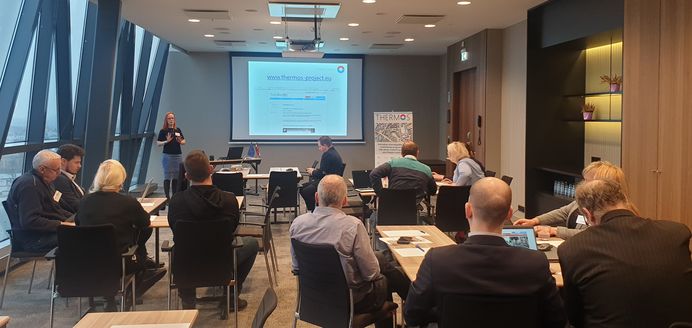
27.06.2019
THERMOS becomes Celsius “City Supporter”
THERMOS and the Celsius initiative are joining forces to support cities in deploying carbon neutral, affordable, sustainable, smart, and integrated heating and cooling solutions.
Celsius is a collaborative hub made up of member cities, as well as “city supporters,” including organisations that support cities in developing and optimising their heating and cooling solutions.
THERMOS will support the initiative as a Celsius City Supporter in contributing valuable expertise assisting Celsius cities in the development of innovative heating and cooling solutions. Asa City Supporter, THERMOS will contribute its knowledge and expertise to the initiative, and warmly welcome Celsius Member Cities to THERMOS events, as well as its Training and Ambassador groups.
For more information about Celsius, click here.

24.06.2019
THERMOS goes global at the IDEA Conference 2019
On 24 June, THERMOS partners CSE and CREARA presented the THERMOS software at the IDEA2019 conference’s District Energy Workshop taking place in Pittsburgh, US.
During the session, the THERMOS tool was presented to an international audience of district energy experts and professionals. Partners showcased the software’s merits as a data-driven, state-of-the-Art energy mapping and modelling tool designed to drastically simplify and optimise local energy planning and to subsequently accelerate the planning and development of thermal networks in Europe and beyond. The session featured an in-depth discussion on the approaches to methods and models for high-resolution energy mapping data and highlighted taken by THERMOS.
After the successful launch of THERMOS v5 at the European Sustainable Energy Week (EUSEW) in Brussels the week before, IDEA provided a unique forum to engage with the district energy community beyond Europe, bringing together stakeholders from the public and private sectors from around the world.
THERMOS Partners invited stakeholders to explore the software themselves online and to discuss their specific needs. Interest and feedback of the experts attending both EUSEW and IDEA confirmed the unique benefit the software will bring to conducting pre-feasibility studies and local energy planning processes and will feed into the final version to be developed and ready by June 2019.
Interested to explore the software yourself? Follow the link here for access and sign up to our Training & Ambassador Programmes to receive exclusive advice on your thermal energy planning and the optimal use of THERMOS.
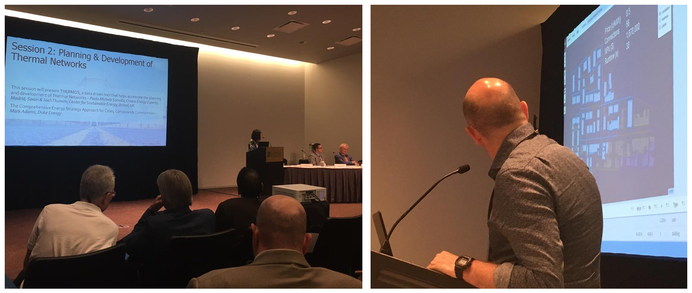
17.06.2019
THERMOS software now available on the website
The THERMOS software v5 is now freely available on the THERMOS website. Having successfully passed its stress test during the THERMOS partner meeting in Cascais, the software is now accessible for all interested stakeholders and local energy planners to explore online. The official launch will take place on Wednesday, 19 June at European Sustainable Energy Week (EUSEW) in Brussels.
All interested can access the tool now – alongside a step-by-step demonstration video – online by clicking here. Participants of the EUSEW conference are also invited to explore the tool in-person with THERMOS experts at the THERMOS stand at the Energy Fair Networking Village in the Charlemagne building.
Stakeholders interested in getting more involved with the software and in strategically promoting the benefits and roll-out of THERMOS are invited to join the City Interest and Ambassador Group and the free online Train-the-Trainer Programme. THERMOS Trainers and Ambassador will not only receive exclusive guidance for using the software, but also learn about state of the art energy planning and DHC network implementation practices.
THERMOS is a free, user-friendly, state-of-the-art energy system mapping and modelling software tailored to support local authorities and energy planners in their thermal network planning. The tool offers address-level data relevant for expanding existing systems, planning new systems, or assessing specific network vs. non-network solutions.
For more information on the tool please contact info@thermos-project.eu. If you want to join the Ambassador Group please sign up here, interested Trainers can sign up here.
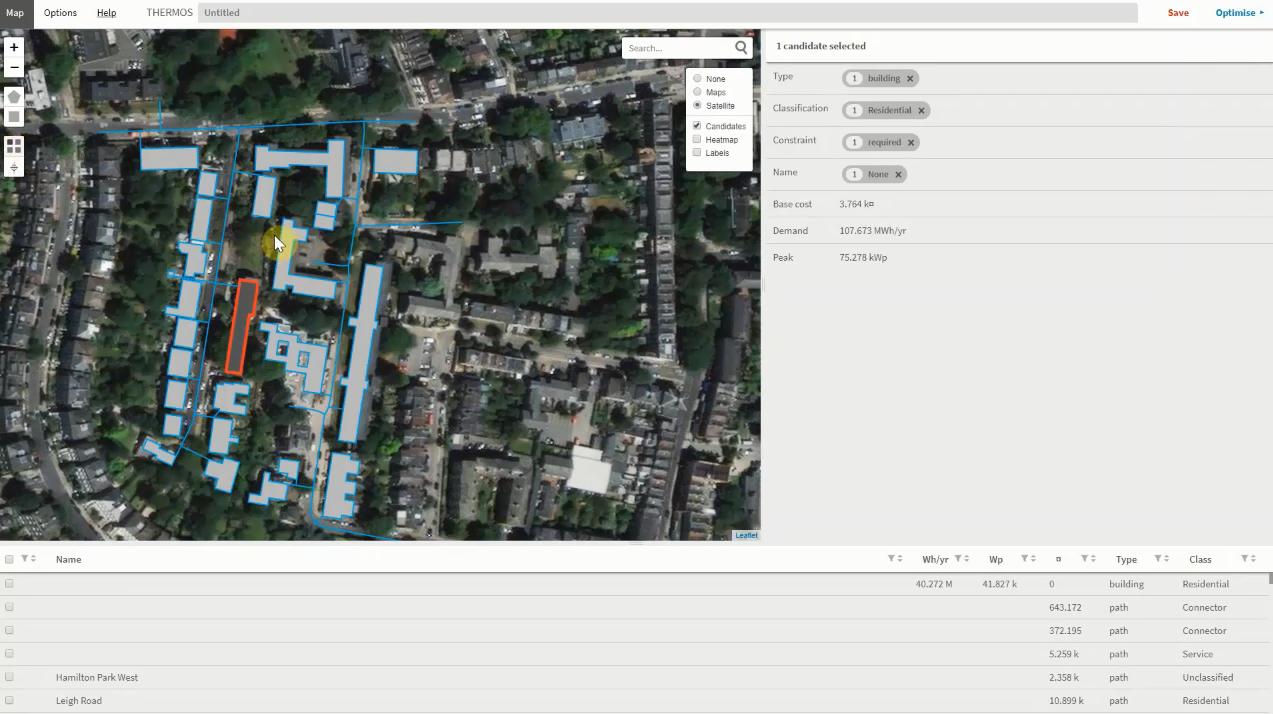
23.05.2019
THERMOS 2nd Training Programme and Ambassador Group launched
On 23 May 2019 THERMOS partners launched the second edition of its successful capacity-building Train-the-Trainer Programme at the THERMOS 4th Training workshop in Cascais (PT). With both the Training and the THERMOS City Interest and Ambassador Group, THERMOS partners seek to enable (local) energy planners from across Europe to use the THERMOS energy planning software developed for a simpler and more cost-effective low-carbon local energy planning process now available for application.
Both programmes are closely associated with each other in their aim to support a faster upgrade, refurbishment and expansion of existing local energy infrastructure and the development of new low carbon heating and cooling systems.
The THERMOS Ambassador group, open to all exemplary institutions and organizations involved in sustainable thermal energy planning and the development of local sustainable action plans, is granted exclusive access to THERMOS solutions, state-of-the-art tools and materials. The programme supports the building up of capacity among European local energy planners to promote the adoption of the THERMOS software and provides visibility and specialized training opportunities like the free Train-the-Trainer Programme.
The Train-the-Trainer Programme will take place online via a series of webinars and is designed to provide participants with an overview over state-of-the-art district energy technologies, practices and modern financing options for an effective energy transition on a local level. With the THERMOS energy planning software advancing into its final stages of development before the release of its final version in 2020, Trainers will furthermore get to test and receive exclusive guidance on how to apply the software to their context becoming certified Trainers upon completion of the programme.
The launch of both programmes was preceded by an exclusive test of an updated alpha version of the THERMOS software with workshop participants available here. The workshop was wrapped up by a site visit to the Climaespaço, district heating and cooling plant in Lisbon.
If you want to join the Ambassador Group please sign up here, interested Trainers can sign up here.
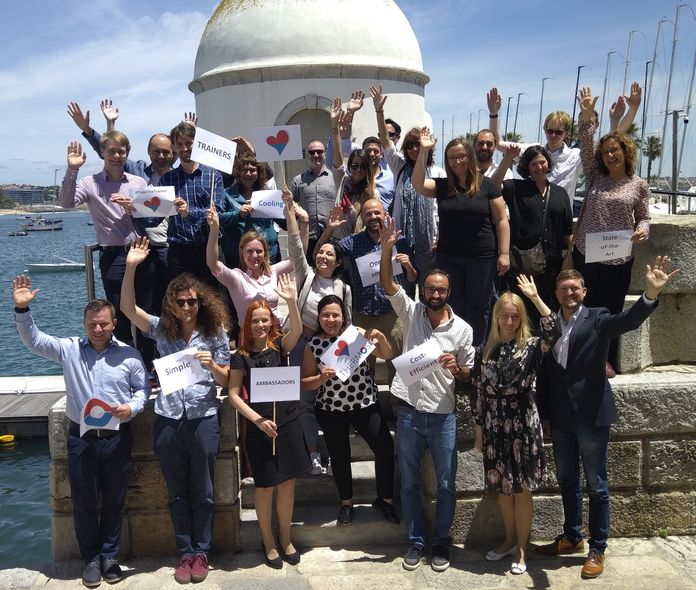
05.12.2018
THERMOS Train-the-Trainer final workshop and partner meeting in Alba Iulia
On 5-7 December 2018 project partners and participants of the first THERMOS Train-the-Trainer programme came together in THERMOS Replication city Alba Iulia for a capacity building workshop and THERMOS partner meeting.
The workshop marked the final event of the THERMOS Training Programme and introduced participants to the new features of version 4 of the THERMOS software. Aiming to enable energy stakeholders to use and apply the THERMOS thermal energy planning software and to train others, successful participants received their final certificate and explored the software for concrete examples, like host city Alba Iulia.
The mid-sized Romanian city is looking to use the tool for evaluating the deployment of district heating networks as an alternative to individual natural gas boilers.
Subsequent study tours introduced workshop participants to the city’s biggest solar array for electricity and thermal energy and a former CHP plant, which supplied the city with heat during the communist era, and now functions as a collection point for e-waste management.
Looking ahead, project partners also discussed the next round of the Training Programme in 2019 and how to encourage the uptake of the THERMOS software once the final version will be available. In an interactive session, THERMOS partners and workshop participants identified key users and early adopters of the tool to support more effective district energy planning on a city level and concluded on a strong added-value of the tool for city planners, due to its address-level application and open source, city driven nature.
The next THERMOS partner meeting and capacity building workshop will take place in May 2019 in Cascais, Portugal.
Sign up to our newsletter to stay up to date on the further development of the THERMOS software, our Training Programme and where to meet us next!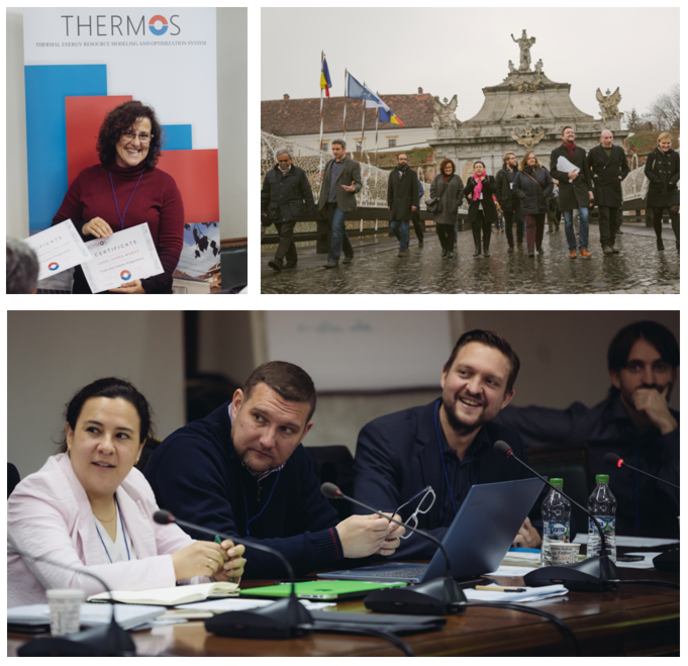
12.11.2018
H2020 sister projects promote thermal energy planning at the 4th SES4GDH conference
On November 12, THERMOS teamed up with its sister projects Hotmaps, Planheat and Heat Roadmap Europe to organise an interactive workshop on heat planning and mapping in Europe as part of the 4th International Conference on Smart Energy Systems and 4th Generation District Heating (4SES4GDH) in Aalborg, Denmark.
Workshop participants were introduced to the tools and functionalities developed by each of the four projects, and received guidance on how to use them for improved district energy planning on a European, national and local level. THERMOS project partners Steffen Nielsen from Aalborg University and Kamal Kuriyan from Imperial College London walked participants through an online live demo of the THERMOS tool, which is looking to make local heat network planning faster, more efficient, and more cost effective. The joint session also provided room for exploring synergies between the four tools and how to ensure future uptake by energy planning practitioners with the audience.
Making full use of the presence of international energy experts gathered in Aalborg, THERMOS partners joined the technical ‘Energy Planning and Planning Tools’ session and organised the a THERMOS Danish Inspire event back to back to the conference. THERMOS partners from Imperial College presented the energy system model they developed, which builds the basis for the THERMOS software, to compare different city level scenarios for district heating systems, taking into account various factors like emissions targets, thermal infrastructure price levels, fuel prices, and different technologies for heat generation.
The 4th SES4GDH took place from 13-14 November 2018 in Aalborg and gathered more than 300 participants from 27 different countries, aiming to showcase and debate the latest scientific findings and industrial experiences related to Smart Energy Systems and future 4th Generation District Heating Technologies and Systems (4GDH) based on renewable energy sources.
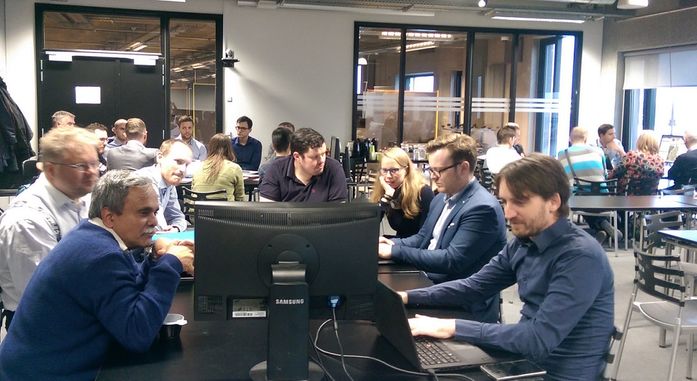
08.11.2018
Latvian stakeholders inspired in Jelgava
The Latvian Environmental Investment Fund, Zemgale Regional Energy Agency (ZREA) and Fortum Jelgava hosted an open seminar and training about THERMOS to inspire more than 30 Latvian cities, heat utility companies, energy agencies and other interested parties. Participants had the opportunity to gain theoretical and practical knowledge on how to use the software.
Project coordinator Martin Holley from the Centre Sustainable energy provided hands-on training, guiding participants through various use-cases to show how the software can support European decision-makers to identify optimal locations and tracks for various heat supply systems. Latvian experts actively discussed the possibilities of using the tool and expressed which functionalities would help expand its use locally and nationally.
As part of their involvement in THERMOS, Jelgava Council will facilitate the mapping and modelling of the city’s current energy demands and networks with a view to reviewing and testing options for expansion, upgrade, and new development that will feed into future strategy and policy making. Detailed study of the experiences of the pilot cities such as Jelgava, and with input from its local partners, will help the THERMOS project to understand what best practice looks like - and how it can be replicated elsewhere. Jelgava is twinned with the Romanian city of Alba Iulia. Find out about the recent twinning meeting through their E-Diaries.
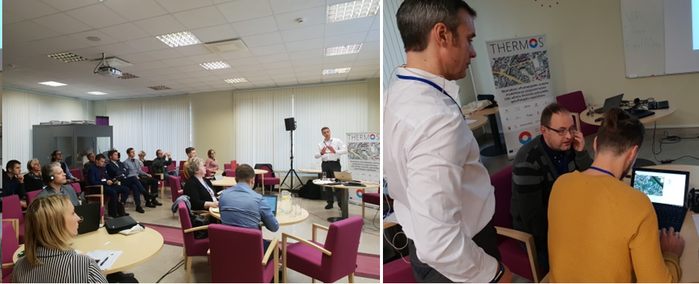
25.10.2018
THERMOS Inspire Workshop at Local Renewables
On 25 October 2018 the 2nd THERMOS Inspire Workshop took place as part of the 9th Local Renewables conference (24-26 October 2018) in Freiburg, Germany.
Along with the conference theme of achieving the “urban transformation to a circular economy” the THERMOS workshop addressed obstacles and opportunities local governments face when moving to a circular heating and cooling model. THERMOS partner Joshua Thumin from the Center for Sustainable Energy (CSE) in Bristol explored the THERMOS software with participants as part of the session. THERMOS pilot cities of Granollers (ES) and Islington (UK) not only showcased their state-of-the-art renewable energy projects but also provided input on the benefits of the software from their perspective as energy planning practitioners. THERMOS partner cities were joined by Dr. Massimo Santarelli showcasing how advanced fuel cell technology is applied in waste-to-energy practice in Torino (IT) as a result of the DEMOSOFC project. The project is the first example in Europe of a high efficiency cogeneration plant with a medium size fuel cell fed by biogas.
The session was followed by study tour to the city of Freiburg’s Gutleutmatten development area which is putting low-carbon energy theory into practice. The area will provide climate neutral energy to about 700 residents through a mix of district heating and solarthermal systems on the roofs playing an important role for achieving the cities ambitious climate protection concept. The tour was guided by experts from Energy provider Badenova and Fraunhofer Institut for Solar Energy.
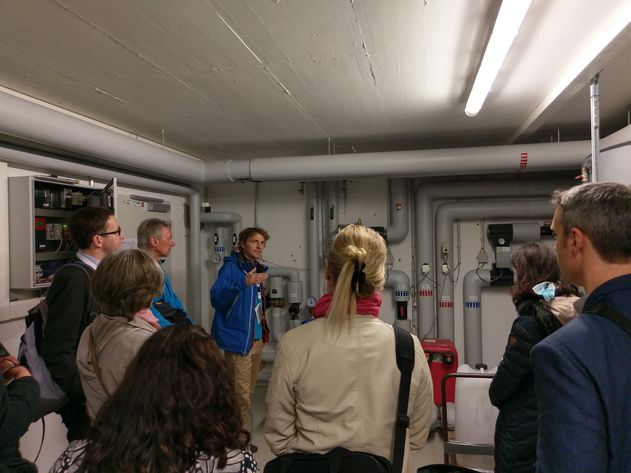
02.10.2018
THERMOS Train-the-Trainer Programme launched
On 2 October 2018 the first in a series of three THERMOS Train-the-Trainer Programme tracks was officially launched with a kick-off welcoming webinar introducing the project and providing an overview of thermal energy supply and demand in Europe. The webinars are geared to enable participants to support a faster upgrade, refurbishment and the expansion of existing infrastructure and to accelerate the development of new low carbon heating and cooling systems to support their local sustainable energy and climate action plans.
Trainers will furthermore have the chance to improve their set of soft skills and learn about district energy technologies and modern financing options for an effective energy transition on a city level. Successful participants the six part online webinar series are awarded a certificate testifying their knowledge about thermal energy system planning and how to use the THERMOS software. The final workshop for the first track will take place in December in Alba Iulia.
The next track will start in summer/autumn 2019 and is open to all interested local and regional energy authorities, energy agencies or representatives from public or private utilities, as well as other stakeholders managing local energy networks.
If you are interested in becoming a THERMOS Trainer and to learn about the THERMOS software follow the link above or contact info@thermos-project.eu.
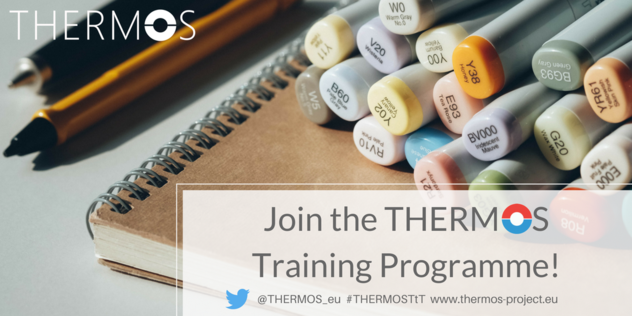
17.09.2018
THERMOS at Global Power & Energy Exhibition (GPEX)
On September 17, 2018 THERMOS featured in the Global Power & Energy Exhibition (GPEX) 2018, taking place from 17-19 September in Barcelona, Spain. The conference took place under the theme of “enhancing the global energy transition” and attracted thousands of power and energy industry professionals from all over the globe. THERMOS partners CREARA and pilot city Granollers took stage on the first day of the GPEX technical programme focusing on ‘Generation and Energy Efficiency’. Partners outlined the tools developed within the project and shared their experience from their real-life applications in partner cities with the audience.
Marta Chillida Munguet, Municipality of Granollers, presented Granollers’ Eco Congost project aiming to reduce carbon intensive energy consumption of the city’s industrial park with a district heating system fueled with renewable energy from two biogas plants and industrial waste heat. Partners stressed the relevance of district heating and cooling for meeting the demand and reaching the municipality’s climate and energy targets, as well as the usefulness of the THERMOS tool for modeling and planning the district heating network accordingly.
Learn more about THERMOS partner cities here.
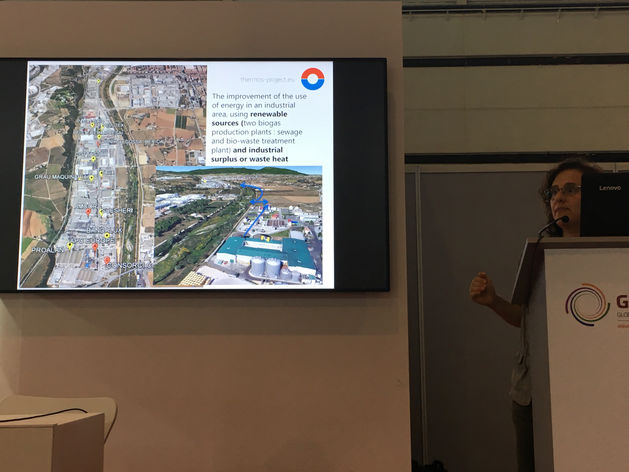
27.06.2018
First demonstration of the THERMOS software at the partner meeting
On 27 June THERMOS project partners and cities came together in Jelgava to unveil the alpha version of the THERMOS district heating planning software to participants of the Capacity Building and Train-the-Trainer workshop.
The software will give planners and the developers of district heating and cooling systems the ability to identify the best options for thermal energy networks in any given area accurately, rapidily and cheaply.
"This was effectively the 'soft launch' of the alpha version - that is, the build stage in which we focus on getting the functionality and interface right," said Josh Thumin, Head of Research at the Center for Sustainable Energy (CSE). "Once this is done, we'll iron out any snags, work on the look and feel, and then release the beta version which will be for public viewing.
"The software is still under development, but is performing well, and our partners are pleased with what they saw," he added.
The meeting also saw the launch of the THERMOS Trainer Certification and Ambassador Programme, which is open for energy planning stakeholders ready to assess and then share the benefits of the THERMOS software for improved local district energy planning and sustainable energy, and climate action planning in cities. As part of the Programme, further Training workshops are planned for external participants.
Relive the meeting and get a first glimpse at the software by checking out the video and stay tuned on upcoming trainings by signing up to the THERMOS newsletter.
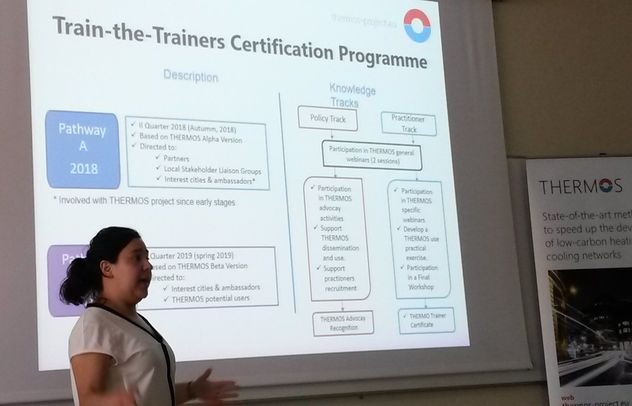
25.04.2018
Warsaw doubles up efforts to tackle air pollution
THERMOS pilot city Warsaw is preparing for a year of continued, targeted efforts to tackle pollution levels. For that purpose, the city has committed itself to a two-fold strategy of continuing the expansion and the refurbishments of the largest district heating network in Europe (currently over 1700 km of networks covering around 80% of the city’s heat demand), while also actively involving citizens in fighting low-stack emissions.
Picking up on its successful #BreathWarsaw campaign from 2016, Warsaw is planning to send eco-educators to more than five thousand homes not connected to the district heating and gas networks yet and faced with the highest pollution levels. The aim of the campaign is “not only to reach [out] to residents with information about municipal subsidies or ways to reduce air pollution, but also [to] help us to update our data on low-stack emissions - says Hanna Gronkiewicz-Waltz, Mayor of Warsaw. The cities Eco-educators will start in mid-May and finish in October to allow citizens to apply for subsidies under the next call open from September.
Having expanded its heating network by 24 kilometers already in 2017, Warsaw will see the modernization of another 19,7 km of those networks operated by Veolia Energia Warszawa. The provider further aims to add another 222 social buildings to its district heating networks by 2020 and has started to go into planning for building a heating network in the neighboring municipalities and those areas of the city that are soon to be connected to a new metro line. The finalization of the THERMOS tool and software will significantly contribute to the optimization of thermal energy system planning and the faster refurbishment and expansion of Warsaw’s existing systems.
For more information about what THERMOS is doing in Warsaw click here or sign up to our newsletter here.

16.04.2018
THERMOS Replication City Berlin hosts annual Energy Transition Dialogue and aims for climate neutrality
This April, THERMOS replication city Berlin turned into a hotspot for debating the transition of the global energy sector with stakeholders, politics, business and civil society from around the globe attending the annual Berlin Energy Transition Dialogue. This year’s instalment of the annual series placed a special emphasis on the relevance and potential of district heating and cooling.
As part of the conference’s side event programme, dena (German Energy Agency), official THERMOS partner based in Berlin, organised guided tours on district heating and cooling with an eye on the latest and most advanced solutions for generating, distributing and storing renewable thermal energy. The tour introduced participants to Germany’s largest district cooling system run by Vattenfall in the heart of Berlin, as well as to an adaptive district cooling system operated by the Technical University of Berlin.
With this year’s Dialogue, Berlin added yet another chapter to its history of tackling climate change and emission rates, after having committed in early 2018 to become climate neutral by 2050. THERMOS is now actively working with its partners to tap into Berlin’s great potential to cut emission of its energy supply and building sector by developing an advanced heat map and exploring options for new networks and heat network expansions across the city.
For more information about the dena's partnership with THERMOS in Berlin click here or sign up to our newsletter here.
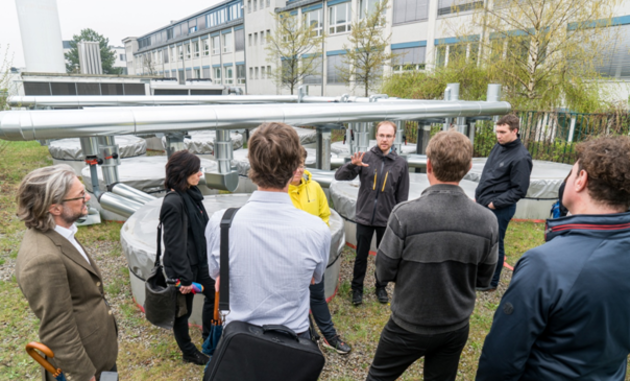
Image: ©dena
16.03.2018
Alba Iulia joins the Heat Roadmap Europe City and Regions Interest Group and "gets smart!"
On 16 March THERMOS replication city Alba Iulia travelled to Amsterdam to participate in the Heat Roadmap Europe (HRE) workshop “Flagship Research on Modelling for Unlocking the Decarbonising Potential in Heating and Cooling”. The city recently joined the City Interest Group of the HRE project, a THERMOS partner project mapping and modeling the energy sector of the 14 EU Member States with the highest energy demand. As a City Interest Group member, Alba Iulia will be working to disseminate and promote the data and results provided by HRE to foster the cost-effective and locally suitable decarbonisation of the energy sector.
In what has been an active year already for Alba Iulia in terms of advancing its sustainable development agenda, the city furthermore committed to a Smart City Pilot Project. As a result, 73 smart city solutions are already being installed at the moment. The city aims to implement at least 100 smart city solutions through mainly public-private partnerships to turn Alba Iulia into the first city in Romania testing integrated smart city solutions until the celebration of 100 years since the Unification of Romania on 1 December 2018.
The pilot project Alba Iulia Smart City 2018 will see the implementation of innovative, smart solutions on local level, largely developed by the private sector on their own costs, to address challenges related to resilience, sustainability, social and economic development, energy and environmental issues by using smart technology and open data. Examples for recent efforts are smart sensors for parking, traffic monitoring and smart waste management sensors. The cooperation with THERMOS partners and liaison groups as well as the THERMOS tool are to provide for a sustainable, smart solution for Alba Iulia’s energy sector.
For more information about what THERMOS is doing in Alba Iulia click here or sign up to our newsletter here.
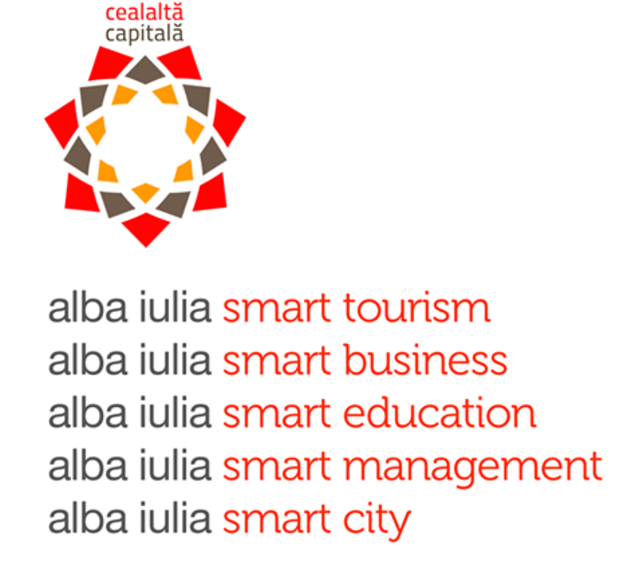
15.03.2018
THERMOS pilot city Granollers cooperates with local industry to improve energy profiles.
On 15 March 2018, THERMOS pilot city Granollers held a meeting with its local industry and companies to address how to lower emissions and costs from energy supply. The meeting took place under the framework of the Granollers EcoCongost project aiming to create a single industrial zone covered by high-efficiency co-generation, renewable sources and district heating. During the meeting the city presented a first analysis of the individual thermal energy demand profiles of the participating companies based on the data collected during the monitoring phase of the project.
The developed demand profiles are to provide the basis for creating energy symbioses and assessing the practical and economic feasibility of covering industrial energy demand through a district heating network gathering its supply form a new thermal energy plant.
Currently, there are 12 local companies actively participating, with the energy needs of another 75 neighboring companies being evaluated. Cooperation and feedback loops between the city of Granollers and the participating companies will be upheld to improve energy demand rates in the coming months. The project is supported by the Barcelona Provincial Council and takes place under the framework of the Catalan Action Plan for Energy Efficiency in Industry. Granollers is currently also working with THERMOS on developing and publishing a free, open-source software to enable more sophisticated thermal energy system planning.
For more information about what THERMOS is doing in Granollers click here or sign up to our newsletter here.
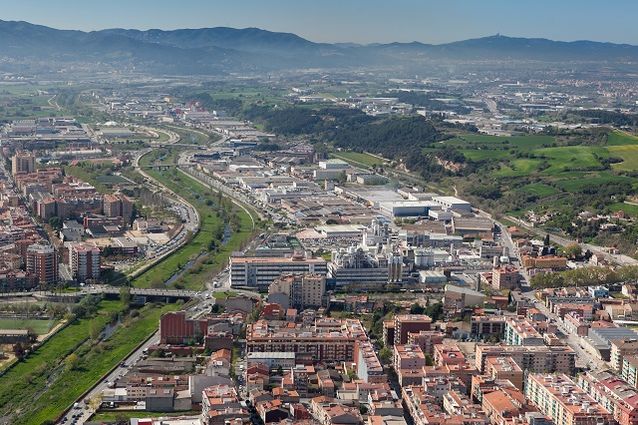
29.01.2018
The first THERMOS Inspire event gathered key stakeholders to make integrated heating and cooling systems a reality.
This January, city authorities and organizations working towards integrated heating and cooling systems came together at the first THERMOS inspire event hosted by the Permanent Representation of Romania to the EU in Brussels. Participants discussed how state-of-the-art planning tools and solutions like THERMOS can assist in the transition towards affordable, clean energy.
Welcomed by H.E. Ambassador Luminiţa Teodora Odobescu, heating and energy experts exchanged on several key issues under the theme of Affordable smart city heating. Dream or reality? Panelists from Cologne, Graz, Stockholm and Burgas not only showcased local level ambitions, but also raised several key policy issues for implementation. Supported by representatives from ICLEI Europe and creara present, cities called for policy frameworks and measures providing economic incentives for market actors to take up long term integrated planning also considering health and living quality in the cities and towns. DG Energy underlined the relevance of THERMOS for Commission work on a future directive on energy efficiency in buildings that looks at low grid impact and harmonized energy system, going beyond the building level to integrate neighbouring buildings, infrastructure and districts. Participants also provided feedback into the THERMOS software, expressing interest in seeing social constraints (such as effects of roadworks or resistance to change of equipment) as well as emission calculations in the modeling tool.
Impressions taken from the event will feed into the next episode of the THERMOS inspire series taking place this coming autumn. For more information about THERMOS sign up to the newsletter here.
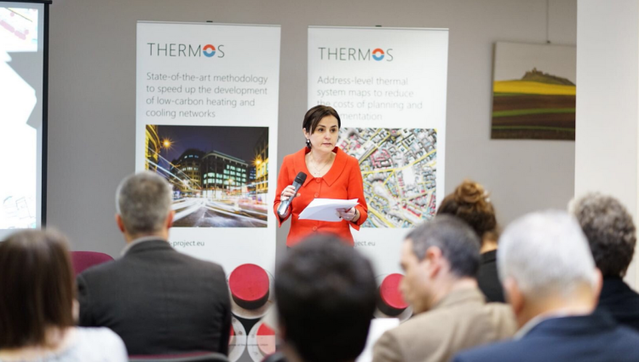
26.01.2018
THERMOS Project Coordinator is paving the way for Bristol to become a ‘smart energy city’
In recent weeks, Bristol (United Kingdom), home to THERMOS project coordinator, the Center for Sustainable Energy (CSE), has made headlines as it sets plans in motion to expand existing heat networks, allowing more businesses and homes in the city to access low carbon, sustainable heat and energy.
Speaking about the current expansion, Kye Dudd, Cabinet Member for Energy, Water and Regulatory Services with Bristol City Council, said: “We know that energy networks make a big impact on our city’s use of carbon. By providing low carbon heat networks we are helping to make a big shift towards ensuring the city is run on clean energy by 2050.”
Expansion to the existing heat networks come as part of wider ambitions to make Bristol a ‘smart energy city’. Ambitions which stem back to April 2015, when the Bristol Smart Energy City Collaboration, an interdisciplinary group, convened by CSE, was established to address the steps needed to be undertaken for Bristol to realize this goal.
The Collaboration, which involves expert organization from across the private, public and voluntary sectors, seeks to establish a workable approach to overcoming the challenges associated with a city-wide energy system, and to understand how such a system can be put to work in the public interest.
One of the ways in which Bristol can further benefit from THERMOS’ work is through our user-friendly open-source software. The tool aims to provide advanced energy system data and models in an application to make heat network planning faster, more efficient, and more cost effective.
For more information about THERMOS, click here or sign up to the newsletter here.

Image: Sourced From Flickr
18.12.2017
Granollers host first THERMOS Stakeholder Liaison Group meeting
The city of Granollers (Spain) hosted their first THERMOS Local Stakeholder Liaison Group meeting on 15 December, 2017.
During the event, the project partners in the city introduced THERMOS, discussed the latest developments of the THERMOS application and shared details about Granollers’ plans to develop its heating network using the project software. As pilot city, Granollers will use THERMOS to investigate various heat network design options and developing modelling scenarios from these.
The event was attended by the Mayor of Granollers, Josep Mayoral Antigas, energy and urban planners from Granollers City Council, and representatives from local institutions such as ICGC, Incasòl and Diputació de Barcelona.
Meeting attendees showed a great interest in the THERMOS project and tools and discussed local considerations for the model development process and their hopes for the model. Attendees were also given the opportunity to raise questions or concerns regarding the THERMOS data, tool and the associated costs. Following the meeting attendees were invited to participate further in the THERMOS project as Trainers.
For more information about the work that THERMOS is doing in Granollers, click here.
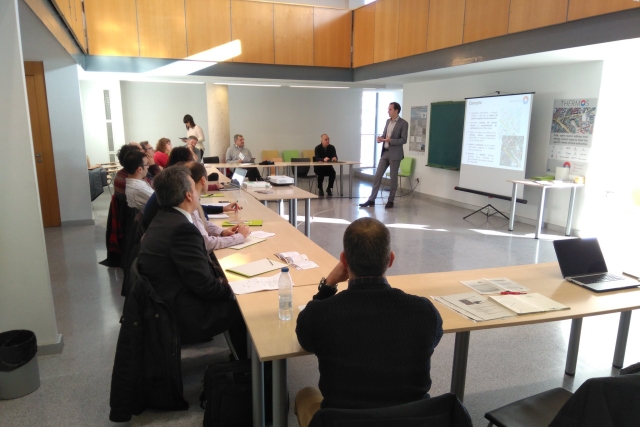
Image: THERMOS project
21.11.2017
Partners and cities gather in Warsaw as city invests in district heating
Poland has long been considered the coal addict of Europe, being the largest burner of coal in the EU. However, in recent years the country has sought to shake off this old stereotype and is moving towards renewable energy sources. According to Poland’s national action plan, under the EU’s renewable energy directive, 15% of their total energy consumption must come from renewable sources by 2020. So far, just below 12% of their total energy consumption comes from renewable sources, but the trajectory is upward.
THERMOS pilot city, Warsaw, has a long history with district heating with the system, the largest of its kind in Europe, being installed in the city after the Second World War. The aging system is now in great need of repair and Poland is investing heavily to do so, having invested more than 30 million dollars in modernisation. Today, an on-going refurbishment programme continues to gradually replace older parts of the network with new components made of pre-insulated materials.
Through their involvement as a pilot city in the THERMOS project, Warsaw will be able to avail of the THERMOS tool and software to help optimize investment plans. The tool, which is currently under development, will provide advanced energy system data and models in a user-friendly open-source application to make heat network planning faster, more efficient, and more cost effective.
Representatives of the THERMOS project, met in the Polish capital Warsaw this month to participate in a Train-the-Trainer Workshop and a project meeting focused on assessing progress made and setting the scene for the next stage of the project. The knowledge and the experience collected over the 3 days will be used in the next phases of the THERMOS project. Face-to-face twinning meetings will begin in the Spring 2018, to encourage uptake of the tools and uptake of heating and cooling solutions.
For more information about Warsaw’s role in the THERMOS project, click here or sign up to the newsletter here.
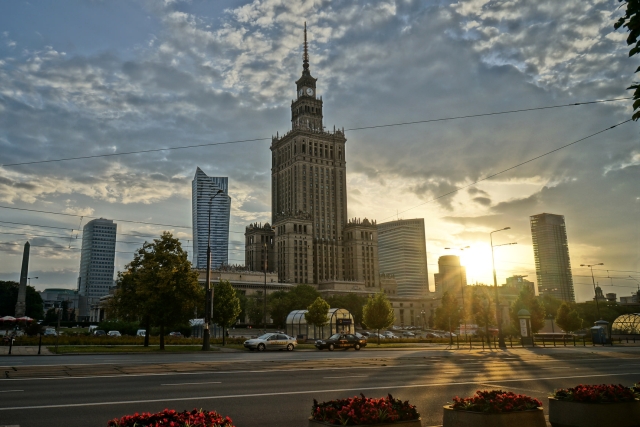
Image: Warsaw, Poland. Sourced from Flickr
14.11.2017
Improvements to district heating could save the UK billions
According to recently produced reports commissioned by the Energy Technologies Institute (ETI) the UK could save £30 billion through implementing eight new route maps in district heating networks.
At present, 56 per cent of UK building heat demand is concentrated within only four per cent of the country’s geographical area, and only 2 per cent of buildings are connected to district heat networks. High initial capital investment and long timescales for installation are key barriers to the wider scale deployment of district heat network. However, there is a clear potential to accelerate the pace and reduce the cost of identifying the most promising networks in a given area, and help ensure that the systems that do go ahead are the right ones. THERMOS aims to make local heat networks cheaper to develop by providing high resolution energy systems maps and free software for identifying viable heat networks.
Speaking about the research, Nicholas Eraut, ETI Project Manager at Energy Storage & Distribution said: “We believe that whilst industry can fund many of the activities required, central government is best placed to support the route maps in areas where commercial investment is likely.”
One UK city actively working to develop heat networks is THERMOS pilot city, the London Borough of Islington. Islington Council commenced work in this area in 2000 and launched its first heat network in Bunhill, in 2012. Islington Council is made more unique by the fact that it also owns and operates its own network, acting as a municipal energy company. Owning and controlling the network and the supply of heating to its residents is a key priority for the council, meeting its goal to secure cheaper, greener heat for its more vulnerable residents.
Islington hopes to build upon its work in this area and through the THERMOS project will continue with the expansion of Bunhill. Islington is also developing plans for further expansions as well as six new heat networks elsewhere in the borough.
For more information about Islington’s heat network plans and the work of our other cities, then visit the cities page on our website.
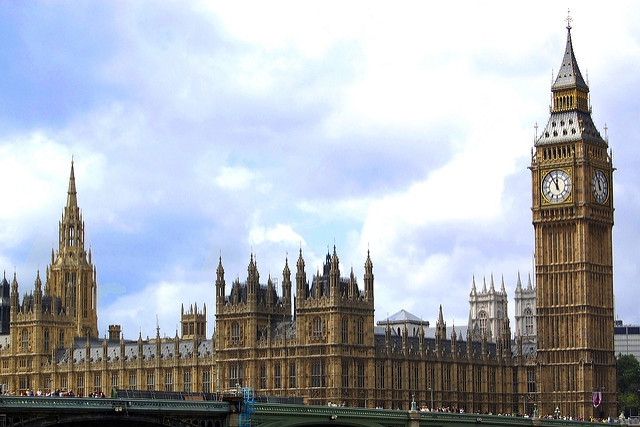
Image: Westminster, London, UK. Sourced from Flickr
03.11.2017
Replication city, Berlin steps up commitment to end reliance on coal power by 2030
In an attempt to further reduce CO2 emissions and in a move towards renewable sources of energy, the German capital has stepped up its commitment to end its reliance on coal by 2030. The move comes following the city’s commitment to stop using brown coal, made a number of months ago.
Currently there are three coal-fired power plants operating in the city, but under new recently passed legislation these plants will be closed by 2030. Speaking about the recent move, Green Party climate protection spokesman Georg Kössler said: “Coal must be reserved for BBQs in Berlin.”
With the move away from coal there is a growing need to identify new energy heating and cooling sources. The THERMOS project can assist with this transition in providing advanced energy system data and models in a user-friendly open-source application to make heat network planning faster, more efficient, and more cost effective.
THERMOS is at present working with Berlin, one of its replication cities, and will continue to work closely with Deutsche Energie-Agentur (Dena), the national energy agency for Germany, and the Berlin City Council to develop an advanced heat map for the Berlin region, and test how that integrates with existing network planning tools.
For more information on THERMOS and their work in Berlin, visit here.

Image: Kraftwerk Klingenberg, Berlin. Sourced from Flickr
25.09.2017
Cascais localise SDGs in first for Portugal
In the first initiative of its kind in Portugal, THERMOS replication city Cascais publicly launched its local commitment to the UN Sustainable Development Goals (SDGs) on September 21.
Countries adopted the 2030 Agenda for Sustainable Development and its seventeen SDGs in 2015. With these goals, countries pledged to mobilise efforts to end all forms of poverty, fight inequalities and tackle climate change by 2030. Cascais is localising these goals and their respective targets through its pioneering “Cascais 2030” programme, which intends to transform the municipality over the next 13 years.
The programme includes the elaboration of a municipal strategy that contributes to their full compliance, impacting upon the municipality's competitiveness, quality of life of the citizens and the preservation of natural resources. This will be achieved by ensuring a broad debate and stakeholder participation, along with management tools to increase transparency and accountability of decision makers. In an innovative approach, Cascais will require all envisioned city projects to undergo a mandatory evaluation of the impacts on the SDGs and their targets. The initiative was commended by UN Secretary General António Guterres who wrote a letter of congratulations to the Mayor of Cascais, Carlos Carreiras.
An online dashboard containing all information about the “Cascais 2030” programme has been set up. THERMOS is among the good practice examples cited, specifically under Goal 11: Sustainable cities and communities. With cities accounting for 60-80 per cent of energy consumption and 75 percent of carbon emissions, urban planning tools such as the THERMOS software will be key to meeting the goals of decarbonisation and high resource efficiency contained in the SDGs.
Find out more at the “Cascais 2030” Dashboard or read the “Cascais 2030” Baseline Report (see THERMOS on page 88!), both in Portuguese.
Find out more about Cascais and their role in THERMOS, here.
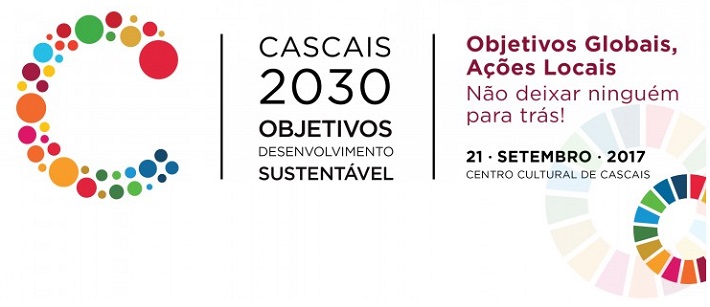
17.09.2017
Open House at Bunhill Energy Centre (Islington)
Islington’s Bunhill Energy Centre, one of the London borough’s best-known and unusual buildings, opened its doors to the public as part of the Open House London last weekend. For the occasion, 230 visitors from all over the UK and some from beyond came to see inside the Energy Centre, to find out more about how the system works and to hear about ongoing expansion works. The audience ranged from people who had never heard of district heating through to engineering enthusiasts. The reaction from visitors was extremely positive, and the most common question was “Why isn’t everywhere doing this?”
Bunhill is Islington Council’s ground-breaking scheme retrofitting district heating in an inner-city environment. The energy centre houses a 1.9MWe gas CHP engine and 115m3 thermal store. The network comprises of 1km of trenching with 2km of insulated pipework. As the Borough’s first district-scale heat network, it serves over 800 homes, four offices and two leisure centres. The heat network and energy centre were completed in winter 2012 and provide cheaper, greener heat to residents.
The council manages Bunhill, gaining revenue from electricity and heat sales, which enables the council to pass savings on to residents via reduced energy bills. This approach also creates opportunities for Islington to further expand the heat network and develop further heat network opportunities across the borough and potentially across borough boundaries. In fact, the Council are currently extending the network to connect new build developments, with a second Energy Centre. The project will expand on the Council’s work to tackle fuel poverty and affordable warmth issues, and to investigate how heat networks can help support the move to low carbon heat supply, greater energy security, resilience and efficiency.
Bunhill 2 will capture waste heat from the London Underground via a heat exchange coil, the first project of its kind in the UK and one of the first in Europe. The extension brings in low carbon sources of heat to the residents of five communally heated residential blocks and seeks to supply several other new communally heated residential developments and a school. The new ventilation shaft for is nearing completion (see picture on right).
Find out more about Islington and their role in THERMOS, here.
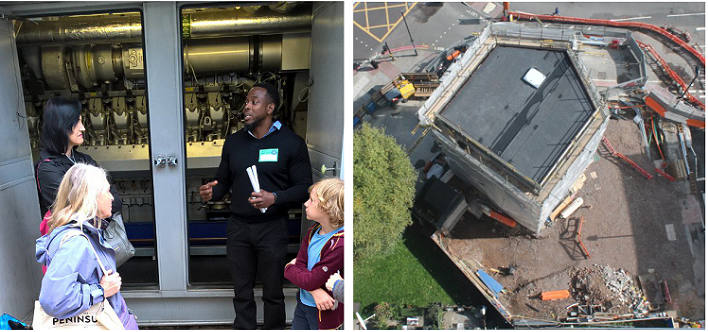
photo credit: Alex Bosher, Vital Energi (left) and Islington Energy (right)
25.08.2017
Jelgava hosts Local Stakeholder Group meeting
The city of Jelgava City hosted their first Local Stakeholder Liaison Group meeting on August 22, 2017. Like Jelgava, all pilot and replication cities involved in THERMOS have established a group of relevant local and regional stakeholders that support their city in the successful management and adoption of the THERMOS tools. On this occasion, the Jelgava project partners (Zemgale energy agency, Fortum, and Latvian Environmental Investment Fund) introduced THERMOS, discussed the latest developments of the THERMOS application and shared details about Jelgava’s plan to develop its heating network using the project software.
The Jelgava Liaison Group consists of city representatives from the local council and various departments, such as the municipal operational information center and the planning department, several local utilities providers, the Latvian Heat Company Association and more. Meeting attendees showed a great interest in the THERMOS project and tools and discussed local considerations for the model development process and their hopes for model.
The meeting also highlighted how the open-source software would facilitate the work of Jelgava city and other Latvian municipalities and heat supply companies. Inga Kreicmane, director of Zemgale region energy agency (ZREA), revealed that currently implementation of various heat supply projects takes a lot of time and financial resources at the planning stage, while the new system, allowing faster modeling, will allow investments to be made more efficiently. Fortum Jelgava representative Valdis Rieksts Riekstins added: "If the city budget is limited, the software will be able to understand the priority investments," he said.
At the different stages of the project, the Local Stakeholder Liaison Groups will meet to provide feedback. This includes providing input on mapping and modelling local energy systems, supporting with embedding the THERMOS application and identifying knowledge gaps and capacity needs for capacity building and training.
Stay posted on what’s happening in each of our cities and their Liaison Group by signing up to the THERMOS newsletter.
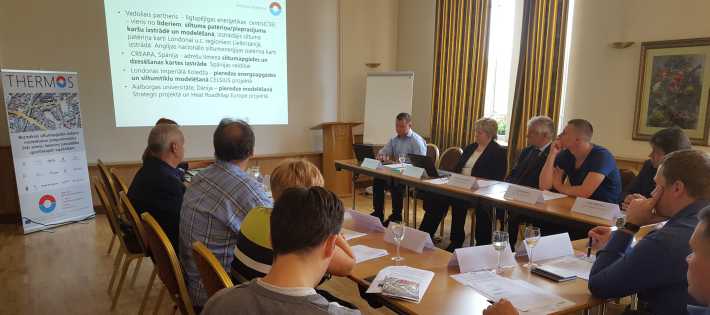
photo credit: Austris Auziņš
22.06.2017
Cities discuss THERMOS Application blueprint at Imperial College
An Application Design Workshop was hosted at the Imperial College (London) on 22 June, to identify and agree on key components and features of the THERMOS application based on the most important thermal planning needs of cities in Europe. According to Dr. Kamal Kuriyan, Imperial College Research Associate, “the workshop was the first step in an iterative process where we will develop and refine the THERMOS model specification based on user-feedback from the project pilot and replication cities.”
Cities present were invited to provide details about their municipal needs, in order to relate user requirements to THERMOS modelling choices. Jelgava (Latvia), Islington (UK), Warsaw (Poland), Granollers (Spain) and Greater London Authority (UK) gave their perspectives on the software blueprint presented by leading modeling partners Centre for Sustainable Energy (CSE) and Imperial College. In order to help the programmers further shape the tool and to identify areas of commonality and difference, the cities set out their specific energy planning challenges as well as special aspects or requirements to be considered.
Josh Thumim, Project Director at CSE, explains further: “Each city has somewhat different needs as a result of its individual circumstances and these workshops are all about exploring how we can produce a tool which is both technically robust and sufficiently flexible for the intended user-groups.” Some vital factors highlighted by cities in the discussions included: data reliability and updatability (GLA), cost-benefits elements to support cities to reduce costs (Jelgava), a flexible tool where economic variables such as heat price can be modelled ‘in-house’ by council staff (Islington), inclusion of additional aspects, ie: social needs of inhabitants and ecology (Warsaw), and "modular" approach enabling the building of scenarios versus business as usual (Granollers).
The latter half of 2017 will see the completion of the initial application design and the production of the first version application software. CSE is keen to keep to schedule: “Our aim is to get the pilot cities testing the THERMOS tool early in the project so we have plenty of time to roll out our replication programme and focus on dissemination and user-training.”
For regular updates on the THERMOS model, to participate in our training workshops and to know about our upcoming activities, sign up to newsletter or follow us on Twitter
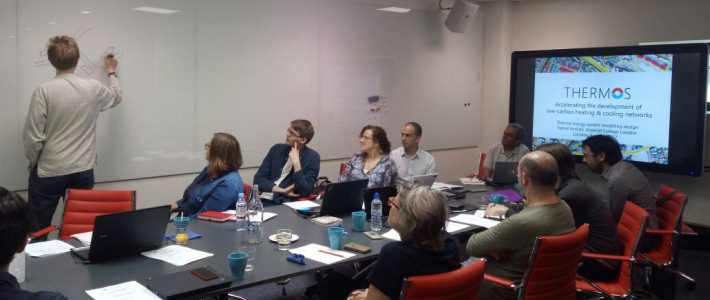
photo credit: ICLEI Europe
22.06.2017
Meet your match: The thermal resource map, model and optimization system made for you!
THERMOS hosted a booth during European Sustainable Energy Week (EUSEW) 2017, showing local authorities, public and private utilities, energy agencies and energy service providers new ways of implementing sustainable thermal energy system planning. Information on current solutions, including how THERMOS amplifies and accelerates the development of new, low-carbon heating and cooling systems across Europe in a cost-effective and efficient way, were shared at the EUSEW 2017 Networking Village 2 on the morning of 22 June.
Through free, open-source address-level energy system maps, THERMOS will enable faster upgrade, refurbishment and expansion of existing networks. Additionally, the Heat Roadmap Europe complements THERMOS’ bottom-up mapping and modelling approach with its na-tional-level Pan-European Thermal Atlas 4, a service analysing the heating and energy systems of the 14 largest users of heat in the EU, covering 85-90 percent of all heating and cooling demand in Europe.
In-depth explanations and live demonstration of the tools were offered at the stand, as well as a Networking Board where participants outlined what they “offer” and what they “need” related to thermal optimization, a business-card bowl for the exchange of contact details.
To know about our next event, sign up to the THERMOS newsletter or follow us on Twitter.
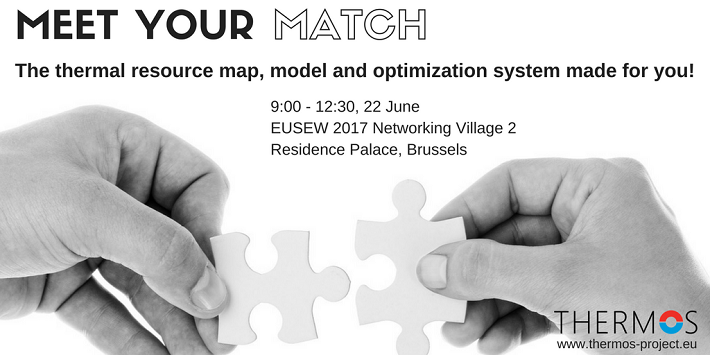
24.05.2017
Islington wins Energy Efficiency and Healthy Homes Award
Pilot City London Borough of Islington won the Local Authority of the Year award at the UK National Energy Efficiency Awards 2017 (previously known as the Green Deal & ECO Awards). Islington was given this award for their excellent work in the energy efficiency sector and for their achievement of energy savings.
As a nominee, the nature, scale and scope of the work carried out by Islington Borough was considered. The Borough and its energy services were also evaluated on the impact that their work has had within Islington Borough, feedback from the local community, the level of in-house skills and expertise and the Council’s priorities for tackling fuel poverty within its current plans.
Congratulations to Islington and we look forward to seeing what achievements come next!
To check out all of the progress Islington has made in their heating and cooling systems, including the Bunhill Heat and Power network and the EnergyPro model, click here.
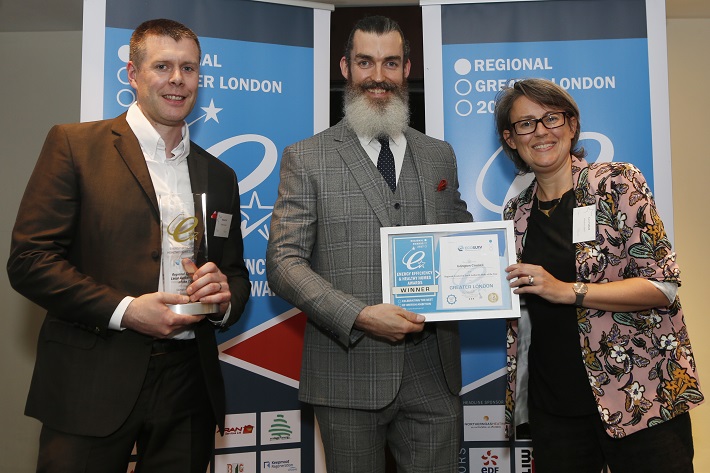
photo credit: Greater London Regional Energy Efficiency & Healthy Homes Awards
27.04.2017
THERMOS partners and cities meet in Granollers to prepare the next steps of the project
Representatives of the Horizon 2020 THERMOS project, including 6 of the 8 Pilot and Replication cities – Granollers (Spain), Cascais (Portugal), Islington (UK), London (UK), Jelgava (Latvia), Alba Iulia (Romania), Warsaw (Poland), Berlin (Germany) – met in the Spanish city of Granollers to participate in a meeting focused on assessing progress made and setting the scene for the next stage of the project. The knowledge and the experience collected will be used in the next phases of the THERMOS project, aiming at accelerating and optimising the planning of local heating and cooling networks in Europe.
Cities involved gave a short presentation on the status of the heating and cooling sector in each respective city and of the needs that the THERMOS tool should address. In a next step, the Pilot cities will commence collection of data and relevant heating and cooling datasets, as well as drafting Baseline Replication Assessment Report. Based on the meeting feedback, leading partner CSE will develop an initial tool design. The first version of the tool will be presented at a technical workshop in London on 22 June (invitation-only), which coincides with the European Energy Week. Face-to-face twinning meetings will also take place in each of the cities starting this year, to encourage uptake of the tools and uptake of heating and cooling solutions.
The project meeting wrapped up with a drive through the Jordi Camp industrial of and a visit of the Vallès Oriental Waste Management plant. The plant, which collects 45000 tons of waste per year, produces ca.8 billion Killowatt hours per year through its composting and biomethanisation. The day wrapped up with a leisurely tour of the historical and pedestrian area of Granollers and a dinner hosted by the Mayor of Granollers Josep Mayoral i Antigas.
To receive regular updates on THERMOS, sign up to the newsletter here.
07.03.2017
THERMOS takes the floor at HRE Workshop
On the occasion of the Heat Roadmap Europe (HRE) workshop in Brussels on Tuesday March 7th, over 80 participants from all over Europe, including consortium partners CSE, Creara, and ICLEI Europe, gathered together for the afternoon to consider the how HRE4 results could support solutions to decarbonise the heating sector on the local, national, and European scale.
Participants learned about the different types of heating and cooling demand and supply, the exact heating and cooling potential, and where it is located. Following this, the much awaited upgraded Pan European Thermal Atlas (Peta4), interactive maps of the heating and cooling demand, efficiency, and supply in Europe, was launched.
Discussions wrapped up with questions from the audience and a panel discussion with related EU heating and cooling projects, to explore synergies and potential for unfolding project results. The “sister projects” present were CELSIUS, PLANHEAT, CoolHeating, and last but not least THERMOS, represented by Joshua Thumim (Centre for Sustainable Energy).
For more information and for presentations visit the Heat Roadmap Europe website.
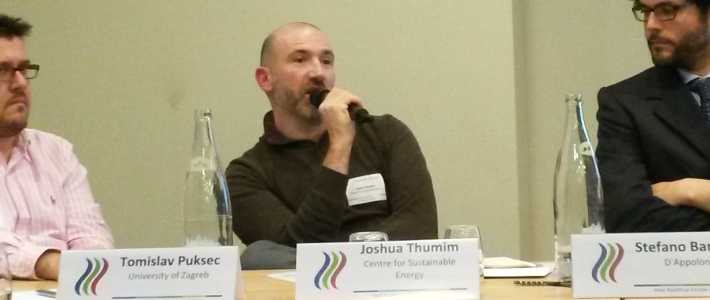

11.10.16
THERMOS project kicks off in Islington, UK
Councillor Claudia Webbe welcomed THERMOS partners to London at the Islington Ecology Centre on October 11th, 2016. The 15 project consortium partners gathered in Pilot City LB Islington, for the occasion of the first project meeting. Martin Holley of CSE, managing the project, stated on the occasion:
"Currently, the processes associated with building and upgrading thermal networks are excessively drawn out due to repeated analyses, pre-feasibility and feasibility studies of different options and routes - a kind of reinvention of the wheel every time someone proposes a district heating network. If we do our job well, THERMOS provides public authorities and other agencies with energy-system mapping methodologies, software and associated modelling tools that enable them to develop, expand and upgrade district heating and cooling systems far more efficiently and cost effectively than they do now. This approach massively reduces planning costs."
Before setting off on a study tour of the Bunhill Energy Centre, meeting participants enjoyed a premiere viewing of an endearing video by the pupils of the local Moreland Primary School about the second phase of the Bunhill Heat and Power project. The children explained how the pioneering Bunhill energy centre would be taking heat from the London Underground, to supply more homes with cheaper, greener heating.
For more information explore the THERMOS website.
